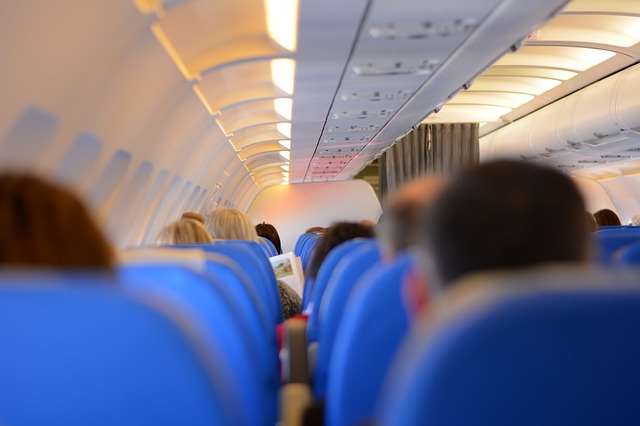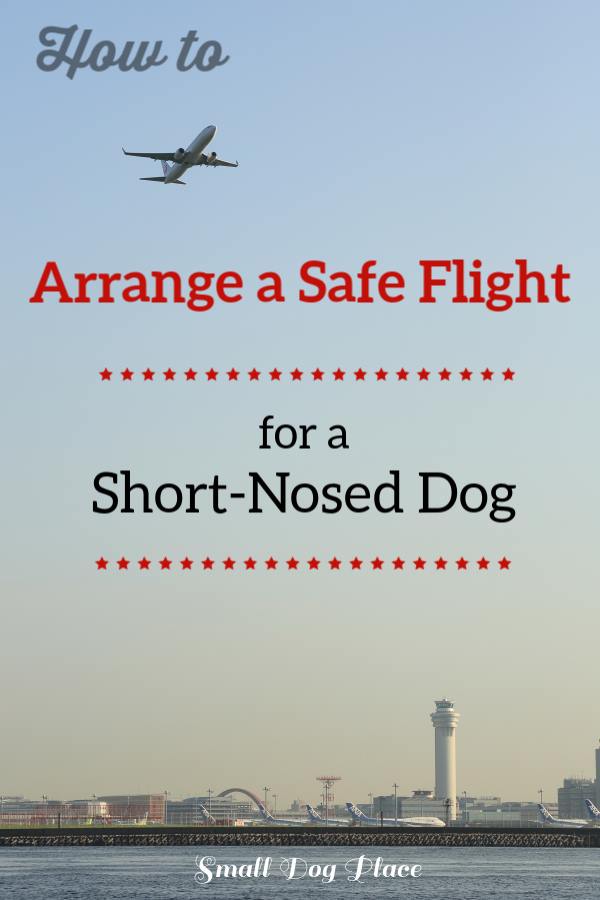Arranging a Safe Flight for Short-nosed Dogs:
Safe Flight for Short-nosed Dogs By Melinda Winters |Updated 09-29-2023
Moving to a new city can be an exciting time. While packing and uprooting your entire life, it can be troublesome to arrange transport for your pet.
If your pet happens to be a brachycephalic dog, transportation can become infinitely more complicated. While these pets are certainly a loving companion, their short-nosed respiratory structure can make them prone to certain health conditions.
Although the animal is generally safe and healthy at home, these conditions can be compounded with air travel.
 How to Plan a Safe Flight for Short-nosed dogs.
How to Plan a Safe Flight for Short-nosed dogs.What Is a Brachycephalic Dog?
A brachycephalic dog is an animal that has been specially bred over generations to have a shortened nose. Typically, the shortened nose is a designer look for appearances only. Bulldogs, Pugs, Pekingese, Shih Tzu, and Boston Terriers are all examples of brachycephalic dogs.
While these animals certainly have an appealing look, the shortened nose can pose many serious health concerns. Having a shorter nose creates a narrow airway and can make breathing difficult.
The soft pallet in these dogs is elongated, and they can often have a narrow opening to the larynx. Further, brachycephalic animals can be at risk for pulmonary hypertension. Brachycephalic dogs can also have several health conditions associated with the shortened nose.
Why Do Airlines Have Restrictions?
Unfortunately, with the several health conditions brachycephalic dogs are prone to, airline travel can be extremely risky and even deadly. Because of this, airlines enforce extremely strict regulations for short-nosed dogs.
When your pet is sitting at home, breathing normally in a stress-free environment, their breathing is smooth, fluid, and effortless. Sometimes though, if a brachycephalic dog goes into a deep sleep they can have difficulty when they first wake up.
The animal may have trouble breathing initially and often makes a "snoring" type sound as their respiratory system struggles to catch up with the sudden exertion.
This is because their respiratory system does not do well with sudden changes that cause turbulent airflow. On an airplane, this condition can become compounded and complicated.
Additionally, in this type of short-nosed dogs, the mucous membranes can become irritated and stressed. When the membranes are irritated it can cause inflammation.
Eventually, if irritated for enough time, animals can develop obstructive airway disease. To some degree, all brachycephalic animals have some level of obstructive airway disease, but it can become severe with prolonged inflammation. This disease too can be complicated with airline travel.
Further, brachycephalic animals can have a hard time regulating their temperature. Dogs do not have sweat glands and need to pant in order to remove excess heat from their bodies.
Often, dogs that already have an irritated larynx and mucous membrane will have a difficult time panting. This can cause the dog to overheat, develop heatstroke, and potentially die.
Between the stress of an unfamiliar airport, airplane, and multiple people surrounding a carrier a dog can easily become overheated.
Couple this with the very real possibility that your pet may have to fly in the cargo hold and the situation can become very dangerous very quickly.
Planning a Safe Flight for Short-Nosed Dogs
Airlines impose very strict regulations on travel with short-nosed dogs for the safety and health of the animal. Most airlines will only agree to fly the animals in colder months.
This is to prevent the animal from overheating. With one potential danger eliminated, flying with a brachycephalic animal can become a little safer.
Although a move in winter months is not always possible, it is always advisable to wait until the weather becomes cooler. While it may be inconvenient, it is to protect your dog. Having a safe and healthy pet in a few months is well worth the wait.
Additionally, as the owner, you can take several proactive steps to ensure that your pet will have the safest possible transport. Overweight brachycephalic dogs can have a difficult time breathing due to their weight.
If you are planning air travel, be sure to maintain a healthy weight in your pet. If your pet is overweight, take steps to help your pet through diet and exercise.
The air quality of an airplane can also impact your dog, especially if your pet must ride in a carrier in the cargo hold. Be sure to purchase a crate with as much ventilation as possible to allow your pet to get the most airflow possible.
Safe Flight for Short-Nosed Dogs: Available Services
If you have to relocate to a new area and are a proud owner of a brachycephalic dog, it can be difficult to find safe and effective transport.
Luckily, brachycephalic pet relocation does not have to be complicated with help from an outside service. A company specializing in pet transportation can help set up the safest mode of transportation possible. This ensures that your pet will stay happy, and healthy, on his or her journey to your new home.
A specialized service can also help with logistics, making sure that flights are continuous, and your pet has an escort for every leg of the flight.
Further, having a specialized service help arrange travel for your pet means that the agent understands the restrictions and health concerns surrounding this particular type of animal. The agent will give you sound advice and suggestions for the best time to schedule transport for your pet.
Helpful tips for people shipping a brachycephalic dog
- Get your dog used to his or her travel crate well in advance. A dog should never be forced into a crate against his or her will. Work gradually to introduce your dog to the crate and make the experience positive. Reinforce good behavior with plenty of praise and food. Over time, gradually work toward closing the crate door behind the dog. Slowly increase the time the dog is in the crate until the dog willingly will go into the space on his or her own, and is comfortable staying in the crate alone.
- Use a larger crate than what is necessary for your pet. Brachycephalic dogs have a tendency to easily overheat from stress and ambient air temperature. The larger the crate the more air that can circulate throughout the space. Be sure to select a crate with plenty of ventilation and air holes throughout the exterior.
- An overweight dog presents its own slew of health problems, but these problems can become compounded in brachycephalic dogs. You can tell if your pet is overweight with a simple visual test. Looking down from above, you should be able to see a slight indent after your dog's ribs. Using your hands, you should be able to feel your pet's ribs with minimal pressure. If you suspect your pet is overweight, begin a regimented diet for your dog. Use high-quality pet food, rich in nutrients, and limit overfeeding. A portion of the pet food can be supplemented with healthy vegetables such as green beans or pumpkin.
- Meet with your veterinarian early in the travel process. A veterinarian will be able to do a full evaluation and determine if your pet is safe to travel. Your vet may be able to identify any underlying medical concerns and treat possible diseases. Finding a potential medical issue ahead of time will prevent possible health scares that arise during shipping.
- Always have your dog properly microchipped. This process is safe, painless, and extremely effective when trying to locate a missing or lost dog. While shipping procedures are extremely organized and professional, there is always the potential that your dog can become separated or lost. Having your dog chipped will give you peace of mind flying and entering a new city.
Author Bio: Safe Flight for Short-Nosed Dogs
Melinda Winters, a certified dog behavior consultant, has been employed with Ferndale Kennels and Cattery for 6 years. She is passionate about animal care and education, focusing on education surrounding misunderstood dog breeds. When not working with our visiting pets, she enjoys time at home with her two pit bulls, Rocky and Sasha.
About Janice (author and voice behind this site)
Having lived with dogs and cats most of her life, Janice served as a veterinary technician for ten years in Maryland and twelve years as a Shih Tzu dog breeder in Ohio.
Her education includes undergraduate degrees in Psychology with a minor in biology, Early Childhood Education, and Nursing, and a master's in Mental Health Counseling.
She is a lifelong learner, a dog lover, and passionate about the welfare of animals. Her favorite breed for over 50 years has been the Shih Tzu, but she has also lived with Poodles, Maltese, Yorkshire Terriers, Beagles, English Bulldogs, Carin Terriers, and a Cocker Spaniel.
When not writing, reading, and researching dog-related topics, she likes to spend time with her eight Shih Tzu dogs, husband, and family, as well as knitting and crocheting. She is also the voice behind Miracle Shih Tzu and Smart-Knit-Crocheting
Does This Article Deserve Your Thumbs Up?
We always appreciate your support and encouragement. Your thumbs up means so much to us. Please like this article.
If you find this page or any page on Small Dog Place Helpful, or useful in anyway, I'd love it if you would click the small heart found on the bottom right of each page.
You can also share or bookmark this page -- just click on the:

Free Monthly Newsletter
Sign Up for Our Free Newsletter and get our Free Gift to You.
my E-book, The Top 10 Mistakes People Make When Choosing a Dog (and how to avoid them)


